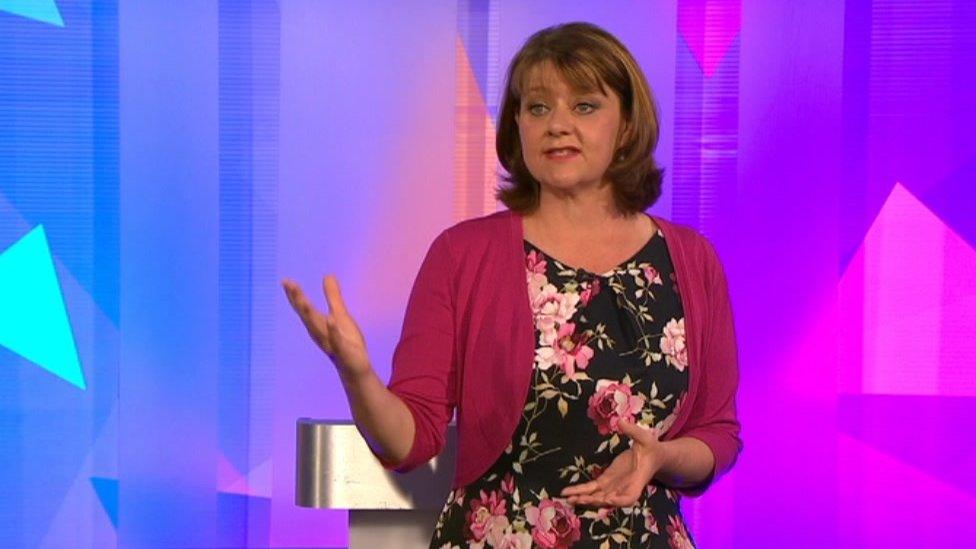General election 2017: Expert view on Plaid Cymru
- Published

Plaid Cymru made some gains at the local elections in May and hope for more MPs in June
Nye Davies of Cardiff University's Wales Governance Centre assesses Plaid Cymru's campaign for the general election.
Plaid Cymru's slogan for the forthcoming election on 8 June is "defending Wales". To some this may well conjure up images of Llywelyn the Last and Owain Glyndwr. The party's rhetoric has focused on protecting Wales from Conservative attacks and their immediate threat. This is a message that is likely to play well in the seats the party currently holds, but can the party venture beyond west and north west Wales?
The problem facing Plaid Cymru is that it has tended to do much better in elections to Cardiff Bay than it has at Westminster. To illustrate this point, the party holds six constituencies in the assembly, but only three in Parliament. If the latest Welsh Political Barometer poll, external is anything to go by, this snap election shouldn't deviate from this trend for the party.
If Plaid Cymru is to buck this trend, it will need to win beyond its heartlands of Gwynedd and Carmarthen East and Dinefwr. The party is making a big play for seats in Ynys Mon, where a former party leader and MP is standing, and for Ceredigion where the party fell 3,000 seats short in 2015. The party may well fancy its chances here against a lacking Lib Dem fightback.
In addition to the two heartland seats, the party is also targeting Rhondda and Blaenau Gwent- one they won in triumphant fashion last year, and the other where they came within a whisker of winning.
But Plaid Cymru has been here before. It was only seven short years ago, with the Gordon Brown-led Labour Party in the doldrums after the financial crash, that Plaid Cymru were talking about returning seven MPs. This never happened. It also failed to happen in 2015. So, it does beg the question, if Plaid Cymru can't break through at a time when the Labour party, at a UK level at least, is weak, when can it?
The recent Welsh Political Barometer poll also suggested that Plaid Cymru, as well as other parties outside of the big two, were being squeezed as a result of the May v Corbyn framing of this election. If that is happening, how does Plaid Cymru get its message heard? It might be that the party reverts to the good old-fashioned method of door knocking; it might also hope that the TV debates will have a positive impact.
In 2015, the impact of the television debates was obvious. Leanne Wood's popularity rose, the increased publicity perhaps being a factor in her winning the Rhondda seat in the 2016 Welsh Assembly election. But the appearances on national television have so far failed to boost the party's wider profile.
Two years on and the party will be hoping that this time their leader's appearances translate into an upturn in support for the party nationally. At a time when Plaid is finding it hard to cut through the presidential-style election we are enduring, the television debates may be the best opportunity it has of achieving this breakthrough.
Another challenge for Plaid Cymru is policy differentiation. In the past, it has tried to tackle Labour hegemony from the left in Wales. The party will argue that it will stand up for Wales better than Labour, and may point to its opposition to the recent Wales Bill in Westminster as an example. But does this provide enough of a difference for the electorate to be able to distinguish the value in voting for Plaid Cymru over Labour? Labour in Wales is determined to present itself as "Welsh" Labour in this election and as the party which will stand up for Welsh interests. Not only does Plaid face a battle on the left with Labour but also in terms of standing up for Welsh interests.
Of course, the focus of this election has been Brexit. Plaid has vowed to stand up for Welsh interests, arguing that a vote for the party will make sure Wales' voice is heard in the negotiation process. However, as the BBC's Welsh affairs editor Vaughan Roderick pointed out, there are not many differences between Plaid and Labour on the key issue of this election. On Brexit, "the two parties signed up to a common policy", referring to Welsh Labour and Plaid's joint white paper on Brexit. He points out that whilst Plaid is "Defending Wales", Labour is "Standing up for Wales".
Plaid Cymru will stress that it is standing up for Wales just as Llywelyn and Glyndwr did. But there are two parties claiming to stand up for Wales in this election - Plaid will be hoping its battle cry is the loudest.
- Published25 May 2017
